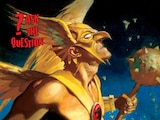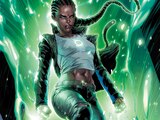You have to wonder sometimes if Batman has any regrets.
Since putting on the cowl, Bruce Wayne has done so much for the city of Gotham and the greater world that no one in their right mind would call him anything other than a hero. But he is still human, and humans make mistakes. Bruce for certain makes plenty of them in Batman: The Long Halloween, Part One, the brilliant new animated movie based on the popular Jeph Loeb and Tim Sale graphic novel. He accuses the wrong people, he mishandles a suspect, he barely manages to keep the Joker from killing much of Gotham. Set early in Bruce’s life as the Bat, this is clearly not the cool, efficient Dark Knight we’re accustomed to seeing.
Yet, even knowing this, it’s still pretty shocking to see what he does with Harvey Dent.

Batman: The Long Halloween, Part One is very much an origin story. Not of Batman and not really of Two-Face, but of modern-day Gotham. Taken together with its upcoming second part, it’s basically the moment that Batman truly becomes the hero that all of us know, fighting larger-than-life villains within an underworld where rules do not exist. Beginning on Halloween night and told over the course of a year, The Long Halloween finds Batman teaming up with a young Commissioner Gordon and a crusading District Attorney Harvey Dent to bring down Carmine Falcone, the most powerful crime boss in Gotham. Meanwhile, a mysterious, efficient serial killer who only strikes on holidays seems to be targeting members of Falcone’s family and gang.
The book that inspired the movie, Batman: The Long Halloween, is a rich, complex and dense graphic novel that was originally published from 1996 through 1997. The movie tackles roughly the first half of the thirteen-issue series, meaning we won’t really see how the animated version of the story resolves until the release of Part Two on July 27. However, knowing what’s ahead, particularly with regard to Harvey Dent, really provides a sometimes uncomfortable filter through which the actions of Batman and Jim Gordon take place.

First, let’s be clear, there’s no questioning that Harvey Dent, as he appears here, is a decent man who truly wants what’s best for Gotham. He’s an effective, uncompromising DA, but he’s not cruel. As Batman states during a visit to Arkham Asylum, it was Harvey who pushed for villains like the Penguin, Mad Hatter, Scarecrow and the Joker to be sentenced to Arkham rather than prison, presumably so that they can get the mental health treatment they need. However, Harvey isn’t without his issues. We learn that he was denied a gun license after a psychiatric evaluation showed some potentially dangerous tendencies—qualities that are hinted and foreshadowed throughout the movie.
Batman and Jim Gordon know this, which makes their enabling of Harvey questionable at best. In The Long Halloween, it’s Batman who gives Harvey his signature two-headed coin, offering it to Harvey when the DA is uncertain whether he should burn the millions of dollars that Falcone has stockpiled in one of his warehouses. While Gordon encouraged Harvey and Batman to “bend the rules, but don’t break them,” destroying evidence to strike a blow against a crime lord who’s evaded justice his entire life gets really close to that line.
Batman’s response? He hands Harvey the coin and suggests that if it’s heads, they burn it all down. One could see this as a way of alleviating the previously clean DA’s guilt, by falsely suggesting it’s up to chance. It’s the slight push that someone who’s worked strictly inside the structure of the law needs to start working outside it, where Batman lives and thrives. However, Falcone’s response to the destruction is to bomb Harvey Dent’s home. Harvey and his wife, Glinda, both survive, but it seems to be the deathblow to their already unraveling marriage. That’s bad news for a man who may be on the brink of a mental breakdown.

It’s hard to imagine the Batman of today doing something like this. At the very least, he would make sure the blame landed on his shoulders rather than anyone else’s. However, these are lessons that haven’t yet been learned. Batman, who at this stage of his life, probably believes Gotham can be cleaned up and saved if he can help put away its competing crime families, sees this moment as a once-in-a-lifetime chance to turn the tables on Falcone. He takes it, likely not fully thinking through what might happen as a result.
The same can only be assumed of Gordon, who actually gives Harvey Dent a gun after Falcone bombs his home. It’s a troubling choice for sure, particularly considering Harvey is emerging as a potential Holiday Killer suspect at this point, but Harvey’s also the only member of the partnership who’s unarmed and untrained, and he’s likely the one who’s most in the crosshairs. You can understand it, but does that mean Gordon should be let off the hook for what comes next?
And we all know what comes next. It doesn’t happen in Batman: The Long Halloween, Part One, but we know Two-Face is coming in Part Two and we know what that means for Gotham. How much death could have been avoided if Harvey had just stayed Harvey? How much safer would the streets have been if he had stayed on the right side of the law, fighting to put away the city’s worst criminals?

We’ll never know. Yet, I don’t think we can fairly blame Batman and Jim Gordon for Two-Face. They meant well and chances are, Harvey Dent still would have wound up on a dark path even if the events of The Long Halloween never occurred. But they do occur, which means that the people accompanying Harvey on that path right up until the end are Batman and Commissioner Gordon. Is stopping a killer and a crime lord worth it if it results in someone even worse who’s both?
Maybe it is and maybe it isn’t, but in Gotham, it’s likely the best we can hope for.
Batman: The Long Halloween, Part One is now available for rental or purchase on digital and disc.
Tim Beedle covers movies, TV and comics for DCComics.com, writes our monthly Superman column, "Super Here For...", and is a regular contributor to the Couch Club, our weekly television column.
NOTE: The views and opinions expressed in this column are solely those of Tim Beedle and do not necessarily reflect those of DC Entertainment or Warner Bros.




















